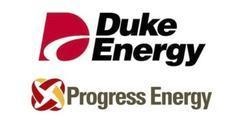Backlash over Duke-Progress merger intensifies

The storm of controversy over Duke Energy's $32 billion merger with Progress Energy is intensifying, with the Charlotte, N.C.-based company facing a credit downgrade, shareholder lawsuits, and legal motions seeking to reopen the regulatory proceedings that approved the deal, which is also the target of ongoing investigations by the N.C. Utilities Commission and Attorney General Roy Cooper.
Among the latest developments:
* On Tuesday, shareholders filed two federal lawsuits claiming Duke Energy officials misled them by abruptly dismissing CEO Bill Johnson, the former head of Raleigh, N.C.-based Progress Energy, and replacing him with former Duke CEO Jim Rogers just hours after the merger won final regulatory approval on July 2. The suits seek class-action status and name as the defendants Duke's Rogers, CFO Lynn Good, controller Steven Young, and Duke board members who were not former Progress directors. Another lawsuit over the CEO change was filed last week in a Delaware court by an Alabama investor who charged that the "director defendants' conspiracy and tactics have had a devastating effect on Duke's credibility."
* On Wednesday, Standard & Poor's lowered its corporate credit rating for Duke Energy, pointing to the merged company's surprise CEO switch. S&P's said that "abrupt leadership changes at the company have heightened regulatory risk in North Carolina and likely in Florida, significantly weakening the company's consolidated 'excellent' business risk profile under our criteria." Roger Gruber, the N.C. Utilities Commission's (NCUC) consumer advocate, has said that if commissioners had known about the leadership change they might not have approved the deal. Duke Energy released a statement "expressing disappointment" with S&P's action.
* On Thursday, Durham, N.C.-based energy watchdog group NC WARN -- a legal intervener in the NCUC merger case -- filed a set of motions with the commission seeking a formal reconsideration of the merger order and new evidentiary hearings to force the company to prove why the deal should not be revoked. NC WARN points out that during the merger proceedings the company failed to disclose about $2.5 billion it plans to charge customers for improvements at Progress nuclear plants over the next two years. About $1.8 billion of that amount would be charged to the company's customers in the Carolinas -- almost triple the $650 million in savings the company said the merger would provide them, calling into question the public-benefit justification for the deal. NC WARN Executive Director Jim Warren urged the commission -- which is investigating whether it was intentionally misled about the CEO shakeup -- to "re-focus away from the multi-millionaire soap opera and on to its core duty -- protecting the public."
NC WARN has raised particular concerns about Progress Energy's crippled Crystal River nuclear plant in Florida, where the reactor containment building cracked as a result of the company trying to save money on a plant upgrade. The plant has been offline since September 2009, and repair costs have been estimated at well over $1 billion. NC WARN has long accused Progress Energy of cutting corners at its nuclear plants, which is now a potential liability for Duke Energy ratepayers.
Meanwhile, the value of Duke Energy's stock has fallen 6 percent since the merger, which created the largest U.S. utility.
Tags
Sue Sturgis
Sue is the former editorial director of Facing South and the Institute for Southern Studies.
